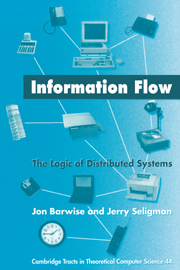17 - Speech Acts
Published online by Cambridge University Press: 05 November 2011
Summary
In this lecture we want to give a simple application of classifications and infomorphisms to analyze J. L. Austin's four-way distinction in “How to talk: Some simple ways” (Austin, 1961). The material in this lecture follows Lecture 4 and is not needed elsewhere in the book.
Truth-Conditional Semantics and Speech Acts
The theory of speech acts owes its origins to Austin's (1961) work. This theory is challenging in a couple of ways. First, Austin's paper is one of his more difficult. It is just hard to figure out what he is saying. Second, the theory of speech acts poses a challenge to certain kinds of semantic theories, and the types of speech acts discussed by Austin in his paper illustrate the challenge very clearly. Austin is saying that there are at least four distinct things a person can be doing with a true utterance as simple as “Figure 4 is a triangle.” One might say that he is arguing that such an utterance can have at least four distinct types of content. The difference is not reflected in the truth conditions of the utterance, but in something else entirely. If this is right, it seems to pose a special problem for semantic theories that try to explicate sentence meaning in terms of truth conditions.
Austin's paper has a special relevance to our project, as well. This work grew out of attempting to flesh out ideas about constraints presented in Situations and Attitudes (Barwise and Perry, 1983), a book that owes much to Austin's general approach to language.
- Type
- Chapter
- Information
- Information FlowThe Logic of Distributed Systems, pp. 203 - 210Publisher: Cambridge University PressPrint publication year: 1997



